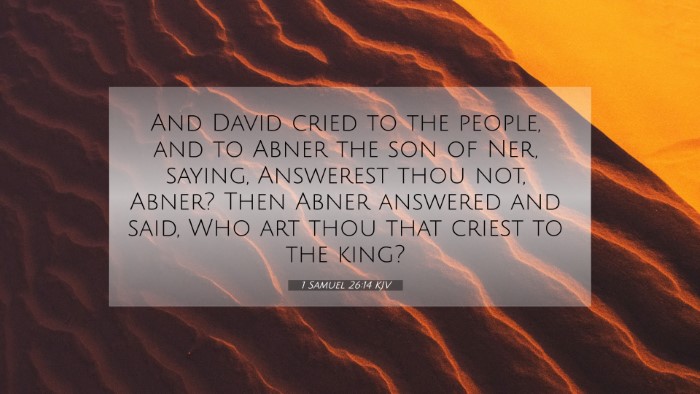Understanding 1 Samuel 26:14
In 1 Samuel 26:14, we encounter a moment of tension and diplomacy between David and King Saul during Saul's pursuit of David. The verse reads:
"And David cried to the people and to Abner the son of Ner, saying, ‘Abner, art not thou a valiant man? and who is like thee in Israel? wherefore then hast thou not kept thy lord the king? for there came one of the people in to destroy the king thy lord.’"
This passage reveals David's strategic maneuver to expose Saul’s vulnerability and challenge the loyalty of his army.
Summary of Commentaries
Combining insights from Matthew Henry, Albert Barnes, and Adam Clarke helps us understand the deeper meanings behind this verse.
-
Matthew Henry's Commentary:
Henry emphasizes David's courage and intelligence. In this verse, David publicly questions Abner's shortcomings—highlighting not only his integrity but also Saul's negligence. This public confrontation served to reinforce David’s leadership qualities while showcasing Saul's failure as king.
-
Albert Barnes' Commentary:
Barnes notes that David's call to Abner suggests a deeper critique of not just Abner, but the entire Israelite leadership under Saul. The situation underscores a moment of reckoning—a reminder of duty and loyalty to the king, which David skillfully uses to elevate his own standing while emphasizing the folly of Saul’s rule.
-
Adam Clarke's Commentary:
Clarke focuses on the implications of David's actions, suggesting they are founded on a mix of rightful indignation and strategic foresight. By calling out Abner, David not only protects himself but also sets the stage for his eventual rise, framing the narrative of injustice against Saul, who failed to secure his own kingship.
Thematic Connections and Cross-References
The events surrounding 1 Samuel 26:14 reflect broader themes within the Bible, particularly concerning leadership, loyalty, and God’s providential plan.
Noteworthy connections can be made to other scriptural passages:
- 1 Samuel 24:10: David spares Saul's life, illustrating his respect for God’s anointed leader.
- 1 Samuel 23:19: The Ziphites inform Saul of David's location, showing the ongoing conflict and betrayal themes.
- 2 Samuel 1:12: David mourns Saul's death, reinforcing his respect for the divine order despite their conflicts.
- Psalm 57:1: A psalm of David that reflects his trust in God amidst life-threatening situations.
- Romans 13:1: The New Testament's teaching on submission to governing authorities, echoing themes of loyalty and respect.
- Matthew 5:39: Jesus teaches about turning the other cheek, indicating a principle of restraint and wisdom in conflict.
- Acts 13:22: New Testament reference on David being chosen by God, emphasizes his significance in redemptive history.
Inter-Biblical Dialogue
The complexities of the relationship between David and Saul serve as a rich field for cross-referencing biblical texts. This instance of David addressing Abner resonates through many layers of Scripture, revealing God’s overarching narrative in both the Old and New Testaments.
Conclusion
Understanding 1 Samuel 26:14 enriches our view of biblical leadership, the importance of loyalty, and God's providential guidance throughout the biblical narrative.
As we explore similar themes throughout Scripture, we can deepen our faith and glean insights on how to navigate our own spiritual journeys.


